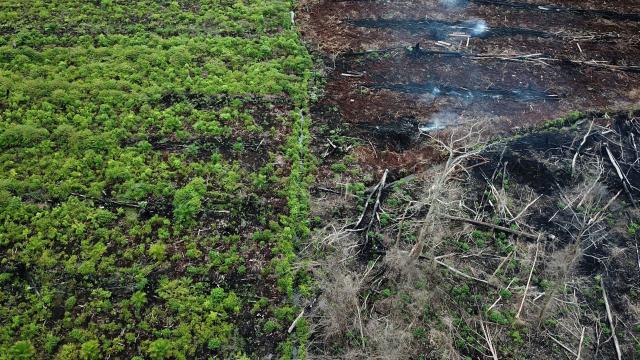Solutions to inequality are often portrayed as being at odds with environmental protection. It doesn’t have to be an either-or choice, though. A new study argues that an Indonesian program to help people out of poverty also saved trees. It shows that sometimes you just need to give people money.
Indonesia is a hot spot for both deforestation and poverty. The nation was one of the top three countries for rainforest loss in 2019, mostly due to burning and cutting down trees to clear land for agriculture to produce palm oil and other products. Meanwhile, over the past two decades, the wealth gap in Indonesia has grown faster than in any other country in Southeast Asia. To help alleviate the latter, the country began a federal initiative called the Program Keluarga Harapan (“Family Hopes Program”) to transfer cash to impoverished households and bring them above the poverty line.
The new analysis published in Science Advances on Friday examined data from 266,533 households in 7,468 participating rural villages between 2008 and 2012. Those households were all located within the 15 provinces that make up half of the country’s forest cover and account for some 80% of its deforestation.
“By using data on forest loss before and after the program started, and by using statistical techniques to eliminate the role of other factors that also affect forest loss, we can use the way in which the Indonesian government phased in the Program Keluarga Harapan as a natural experiment,” Paul Ferraro, professor of human behaviour and public policy at Johns Hopkins University and lead author, told Gizmodo. “We can use villages that participated later in the study period as a control group for villages that participated earlier in the study period.”
The authors looked at geo-referenced administrative, satellite, and field data. The findings suggest that villages participating in the program saw forest loss drop by an average of 30%.
Before the program, when struggling village residents expected low crop yields, they typically cleared more forest to plant more rice and other staples. But when provided with cash payments, many were able to provide for themselves, buying necessary products and taking out loans with their government-provided cash as a guarantee.
In contrast with the new study’s findings, a separate study published earlier this year found that a cash transfer program in Mexico actually led to more deforestation, because increased cash enabled people to consume more land-intensive products. But Ferraro’s research shows that anti-poverty programming and deforestation programming may not always be at odds.
Of course, the anti-poverty program alone can’t solve Indonesia’s deforestation problem, because it’s not just struggling individuals who cut down trees. The Family Hopes Program won’t impact how many trees corporations clear, for instance, and it certainly won’t stop deforestation by forest fires. But Ferraro said the study is still a source for hope.
“It implies that reducing extreme poverty in forested areas is not at odds with reducing deforestation,” he said. “In fact, reducing extreme poverty can be complementary to protecting forests.”
